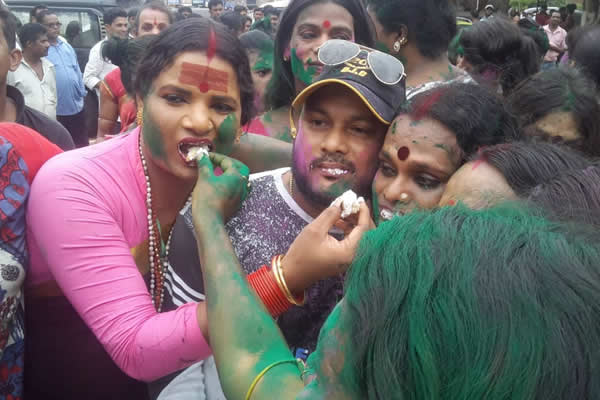The U.N.’s new LGBTI rights watchdog delivered the closing keynote address at ILGA-Europe’s annual conference that took place in Brussels from Oct. 24-27.
“This movement represents enormous strength, but it is a movement that involves so much pressure and requires self-awareness and the ability to take care of yourself so that you can care and look out for others,” said Victor Madrigal-Borloz in his speech that he gave on Oct. 27.
More than 550 LGBTI activists and allies attended the conference.
The conference’s theme, “politics for change, from words into action,” was announced as a forum to promote change by “putting out a loud call to politicians, institutions, partners and allies.”
‘Human rights defenders must be vigilant’
Madrigal-Borloz elaborated on his concern for LGBTI activists when he told the Washington Blade during an exclusive interview before his speech that “everywhere in the world there is enormous progress with legal standards, however, there has been backlash and human rights defenders must be vigilant.” He also discussed the symbiotic relationship between populism and anti-gender backlash when asked about some of the global challenges the LGBTI community currently faces.
“They feed off of each other because equality can be exploited by populist narratives,” added the independent expert. “Where populism is flourishing there seems to be a surge of backlash against LGBTI communities.”
Madrigal-Borloz discussed what he feels LGBTI communities can do in response to this backlash.
“People need to be informed, so it’s critical for LGBTI people to get their stories out there since stories allow people to connect,” he said.
Madrigal-Borloz warned the less visible stories are currently those of women who live in the intersections of discrimination.
“It is important to know the names of Sylvia Rivera and Marsha Johnson,” he said.
In addition to the importance of promoting LGBTI people’s personal stories, the global data on the number of existing LGBTI populations helps secure the understanding they are everywhere. In an effort to heighten visibility and awareness, the Office of the U.N. High Commissioner for Human Rights pursues a working relationship between human rights interests and the private sector through a set of business standards that many Fortune 500 companies promote in collaborations with regional and national LGBTI chambers of commerce.
“Visibility is a priority for LGBTI communities in every region,” Madrigal-Borloz told the Blade.
Madrigal-Borloz: Legal systems don’t ‘resist human rights’
The U.N. Human Rights Council last December named Madrigal-Borloz to succeed Vitit Muntarbhorn, an international law professor from Thailand who resigned because of health reasons.
Madrigal-Borloz, a Costa Rican jurist who was previously the secretary-general of the International Rehabilitation Council for Torture Victims, says there is a “synergy going on with human rights in the world.”
He illustrated the case of Jason Jones, an LGBTI activist who earlier this year successfully challenged the constitutionality of Trinidad and Tobago’s anti-gay Sexual Offenses Act. The case was cited in the India Supreme Court’s Sept. 6 ruling that overturned the country’s sodomy law.
“We see resistance to changing these laws when it becomes a matter of politics,” said Madrigal-Borloz. “But eventually legal systems will change them because legal analysis does not resist human rights standards.”
In terms of balancing legal frameworks for LGBTI rights with the political arena, Madrigal-Borloz said LGBTI people need to be in more elected positions. Currently, 71 countries still criminalize individuals based on sexual orientation and gender identity.
LGBTI activists in India on Sept. 6, 2018, celebrate a ruling that struck down the country’s colonial-era sodomy law. (Photo courtesy of Meera Parida)
With a strong background working to support torture victims globally, Madrigal-Borloz also discussed the practice of so-called conversion therapy.
“I think there is a fair deal of evidence linking conversion therapy with an assumption that there is something deeply pathological about sexual orientation and gender identity,” he said.
He added that complete evidence gathering on the side of the victims to identify the extent of damage created by conversion therapy is needed because it is key to understanding if conversion therapy can be qualified as torture.
“I have the working theory that conversion therapy happens globally with allegations on its practice having been brought to my attention from every region in the world,” said Madrigal-Borloz.
He told the Blade in addition to the harmful narratives that lead to the practice involving conversion therapy, there are anti-gender narratives being promoted in some religious spaces, so dialogues with faith-based communities is a must in the LGBTI human rights movement.
Anti-trans violence rates ‘offend the human conference’
The independent expert says he is “determined to support the mandate” with which he is charged through U.N. Human Rights Council Resolution 32/2 to raise awareness of violence and discrimination against persons on the basis of their sexual orientation or gender identity, and to identify and address the root causes of violence and discrimination. The scope of the work on discrimination and violence is carried out with very careful country alliances.
“The levels of violence against transgender individuals offend the human conscience,” said Madrigal-Borloz as he stressed LGBTI vulnerabilities are exasperated by humanitarian disasters when documentation is needed to receive humanitarian assistance. “For transgender individuals, if their documents are not recognized then they are most often kicked out of the lines of humanitarian assistance.”
Gender identity and recognition acts remain largely scarce in many regions where transgender populations live with no applicable laws regarding the right to their basic dignity as stigma and prejudice so often creates climates of hostility and violence.
“There is no way to deny the existence of transgender persons,” said Madrigal-Borloz. “Identity is the very basic principle of freedom.”
Story courtesy of the Washington Blade.


